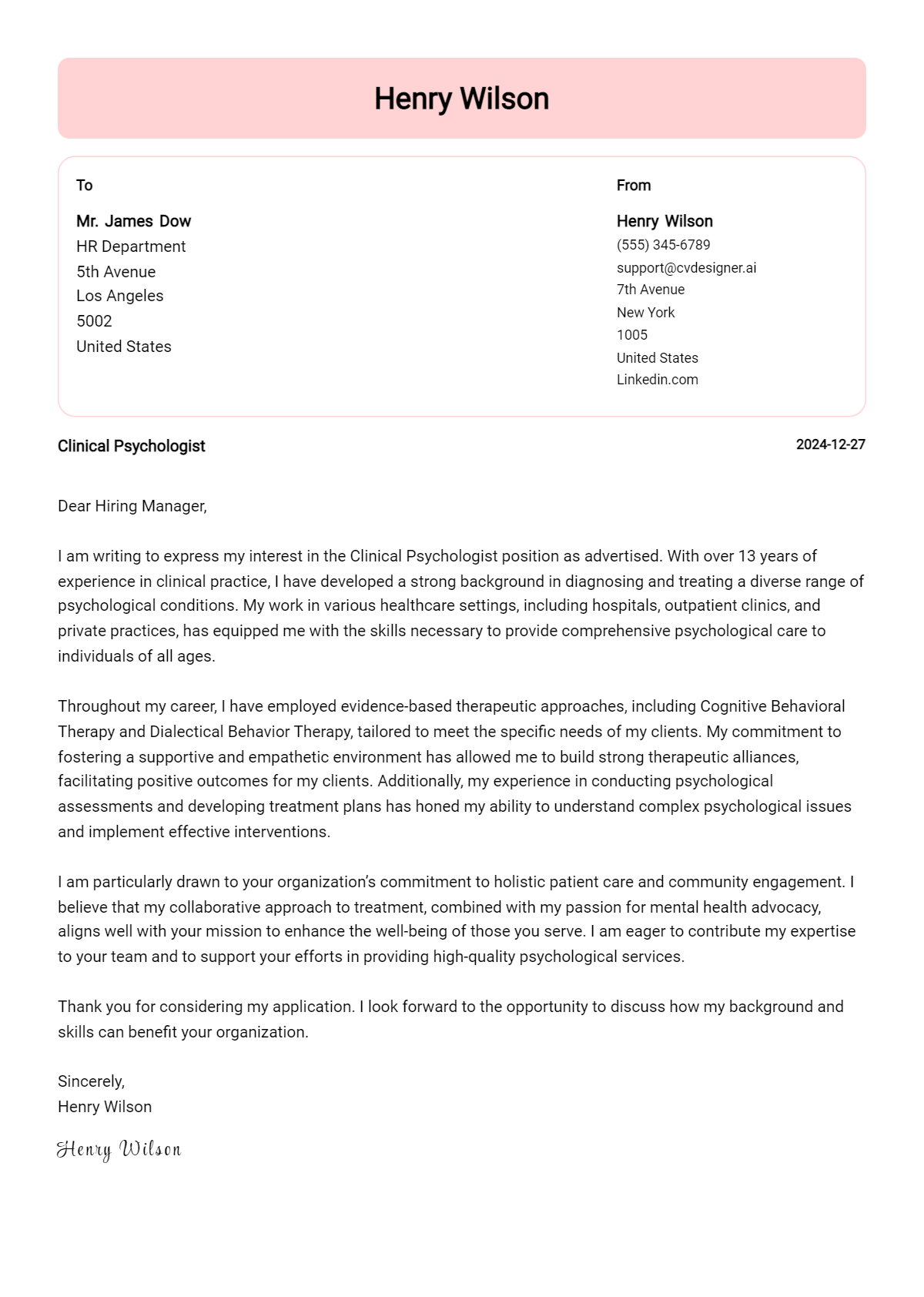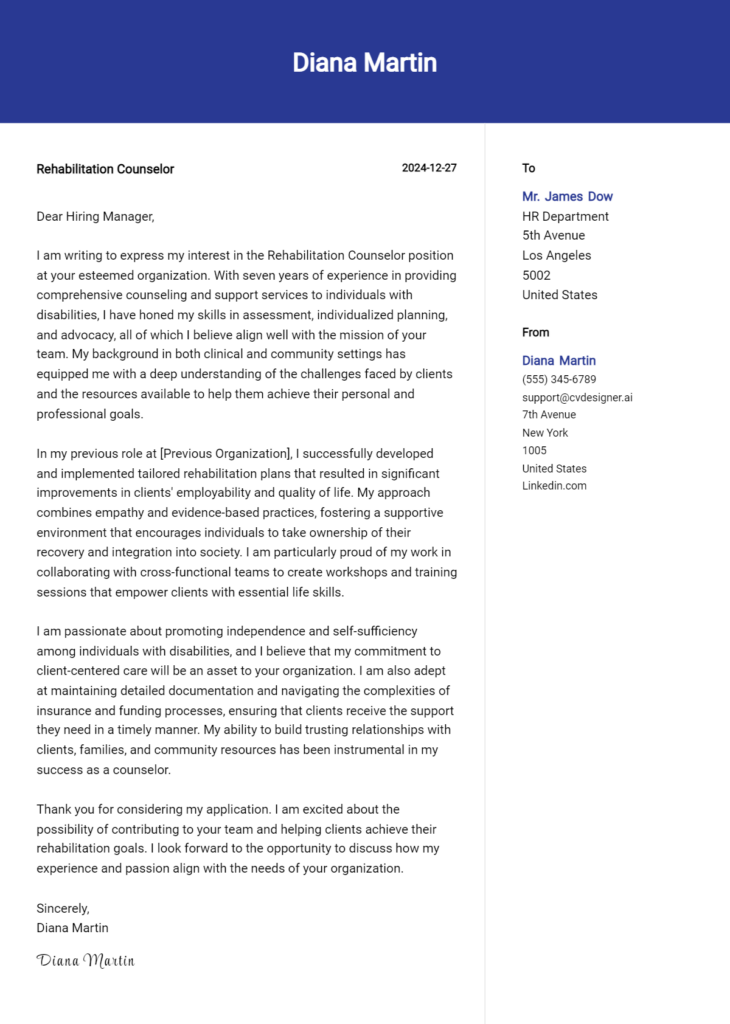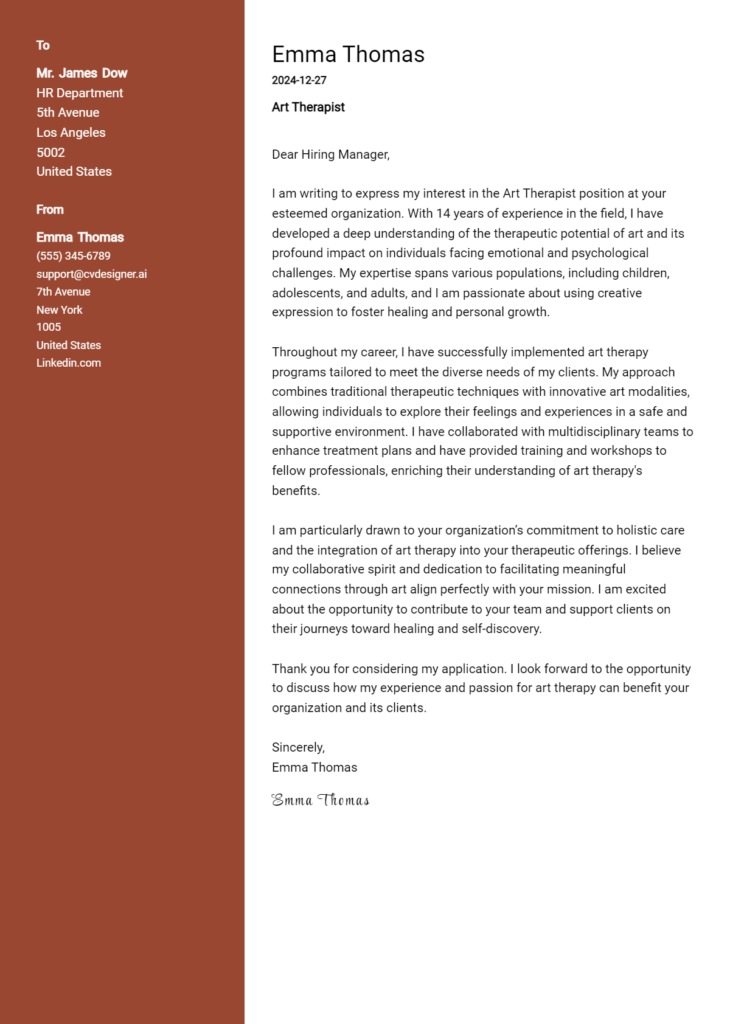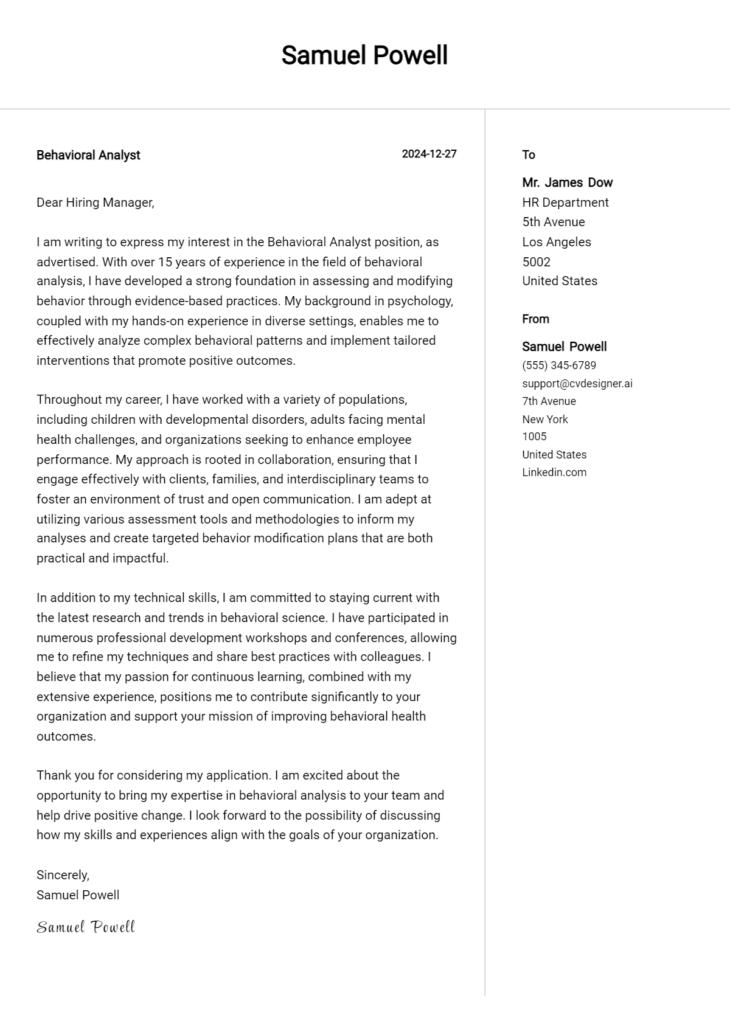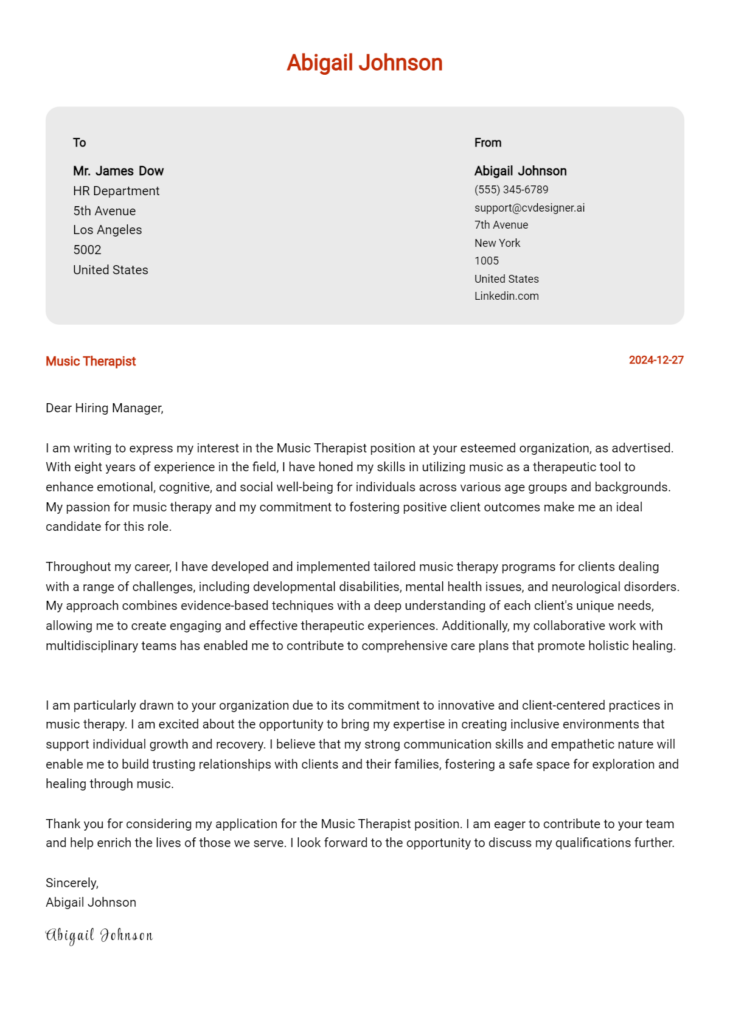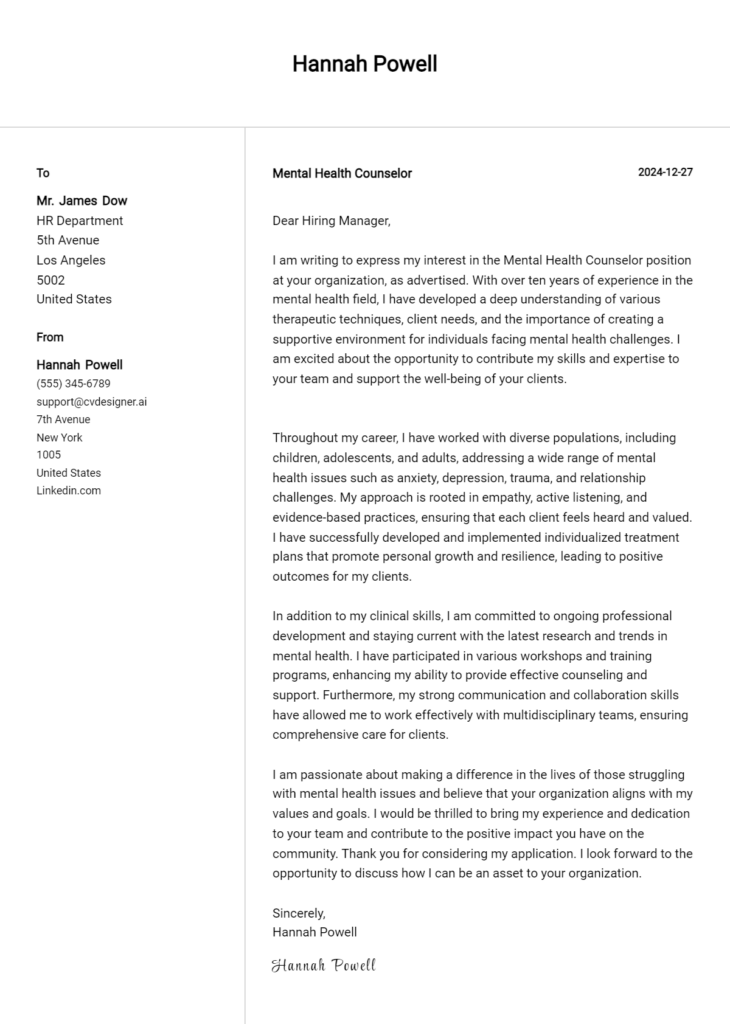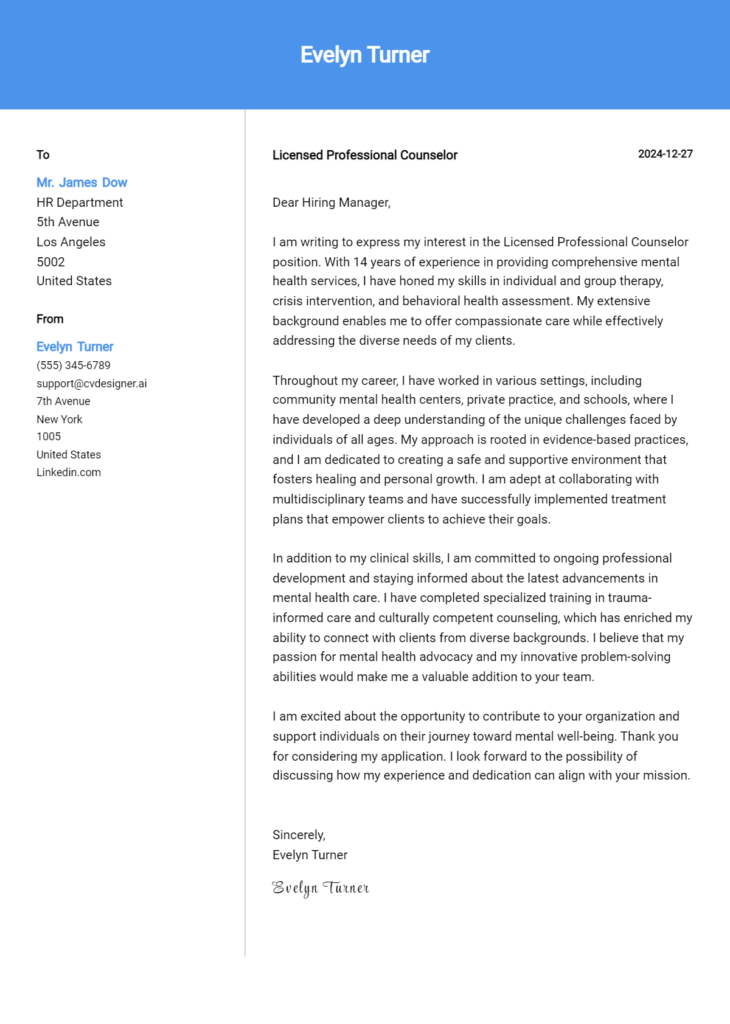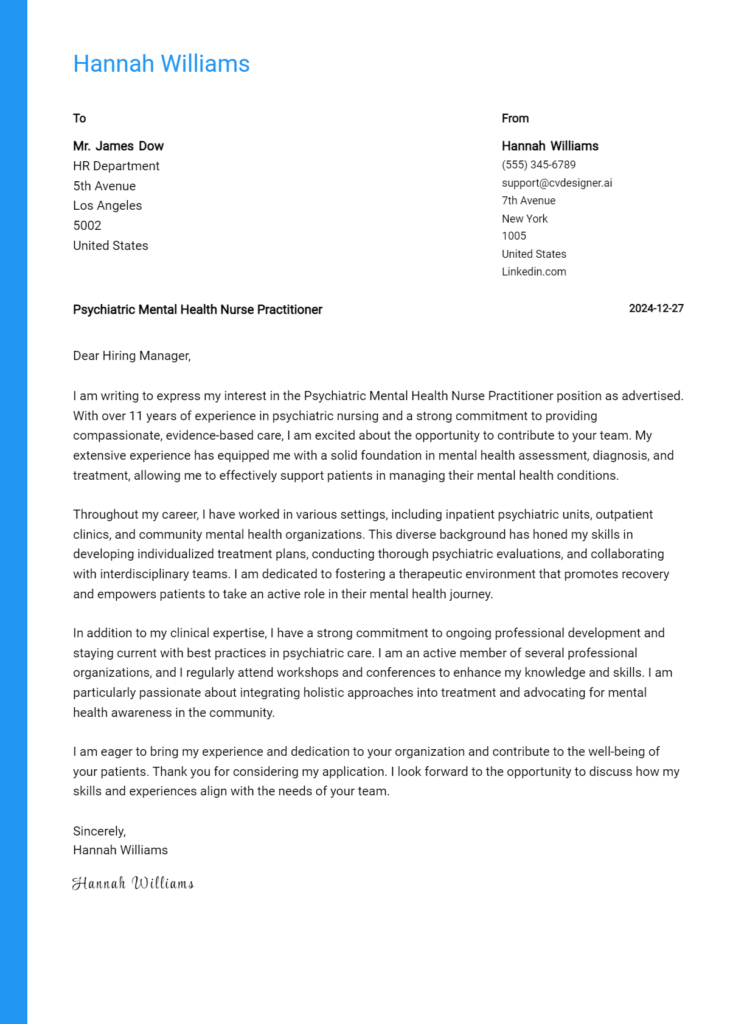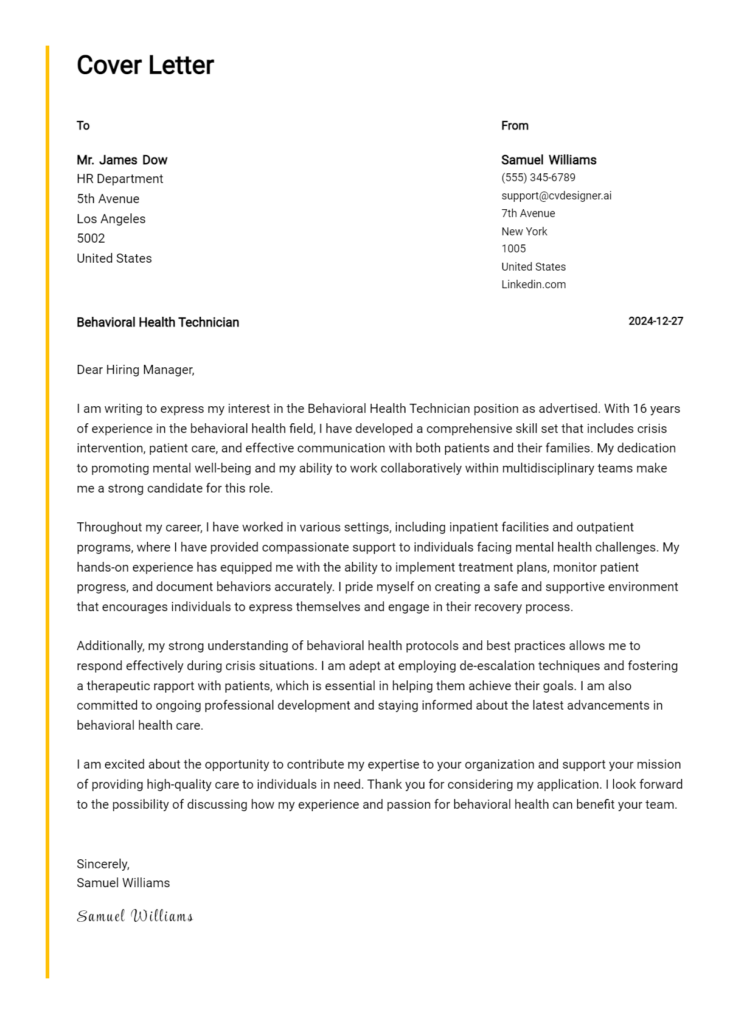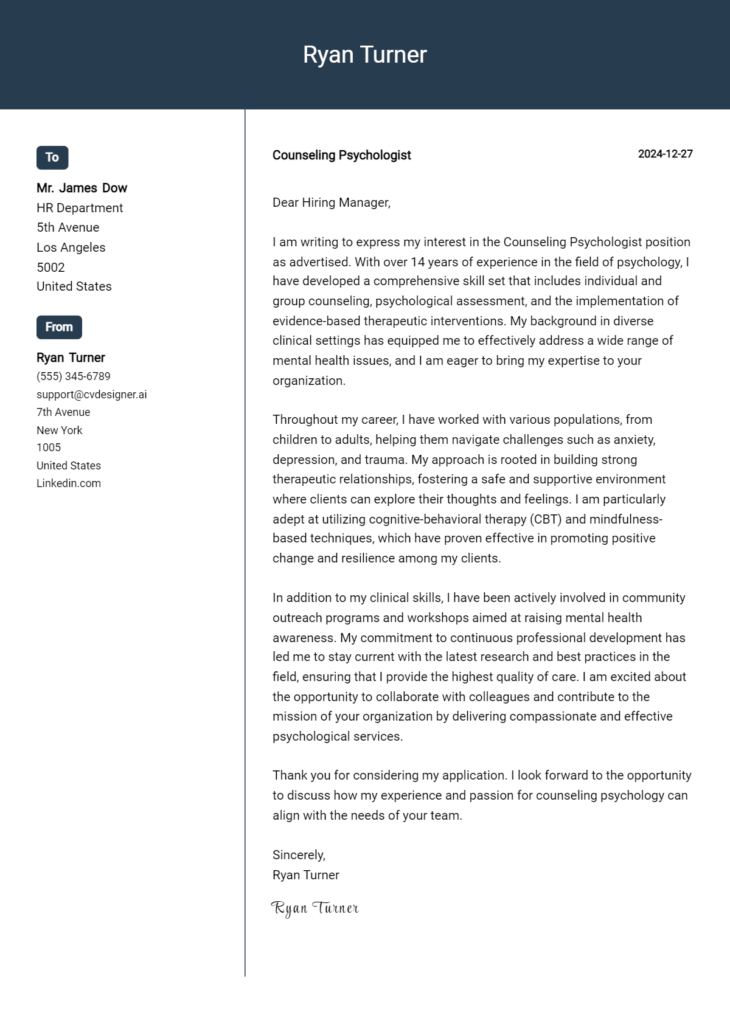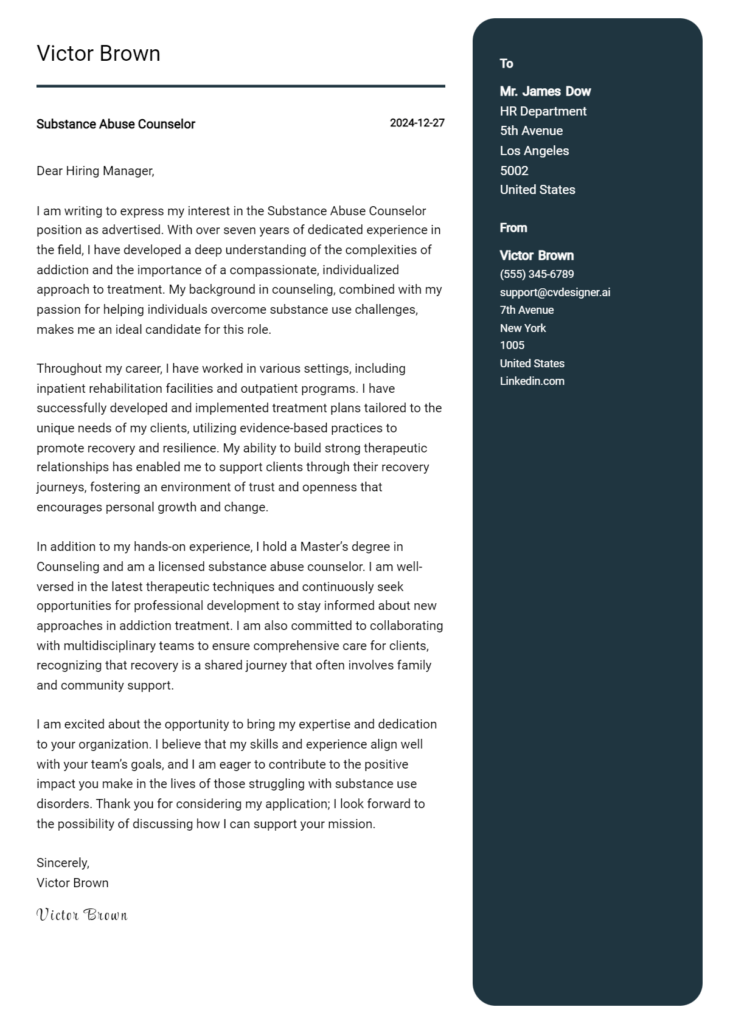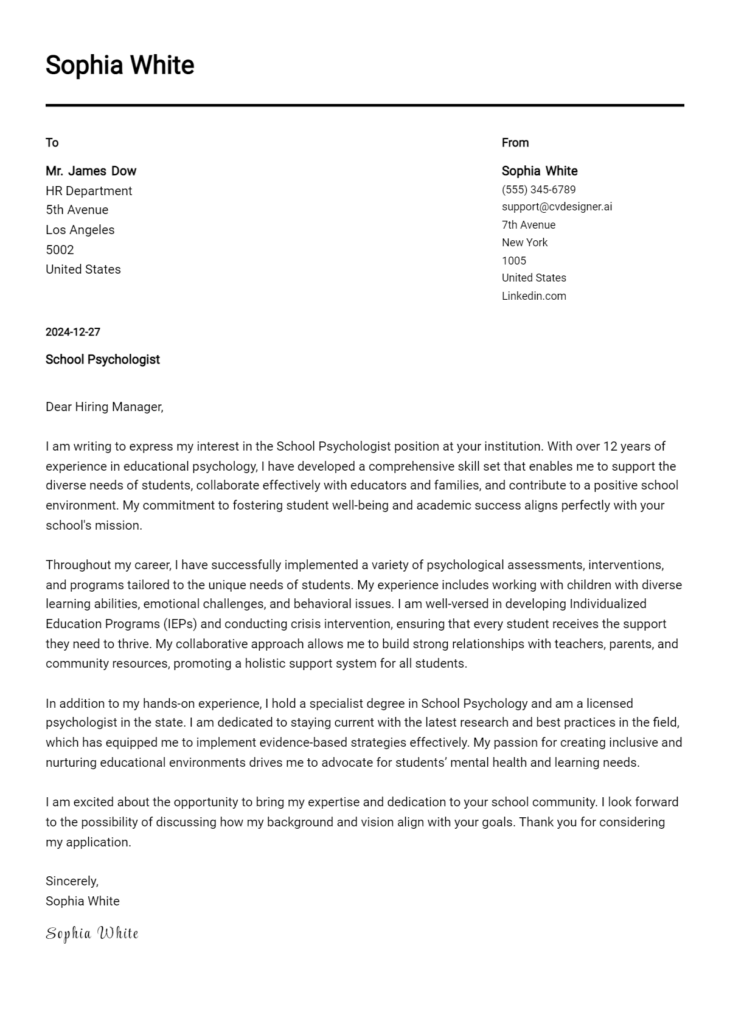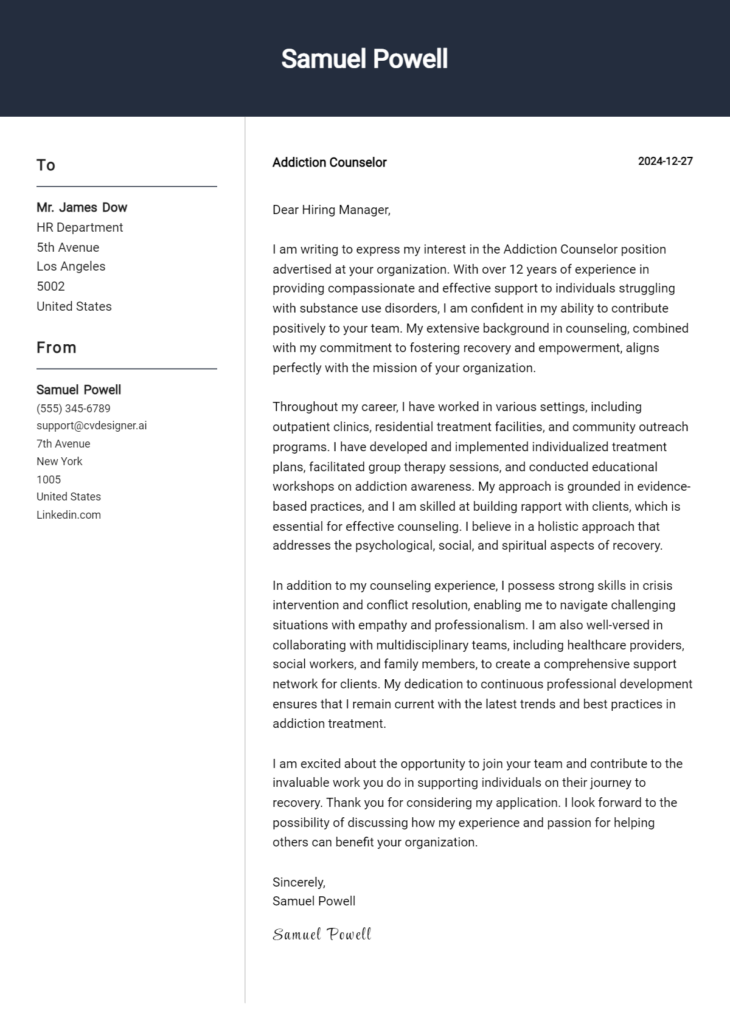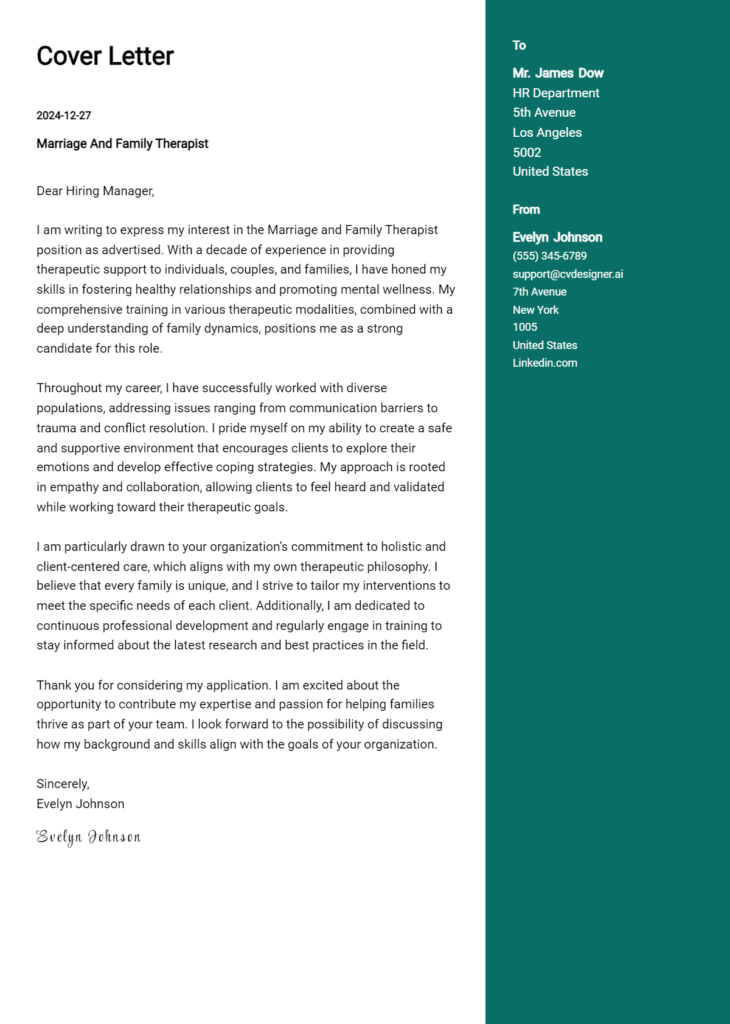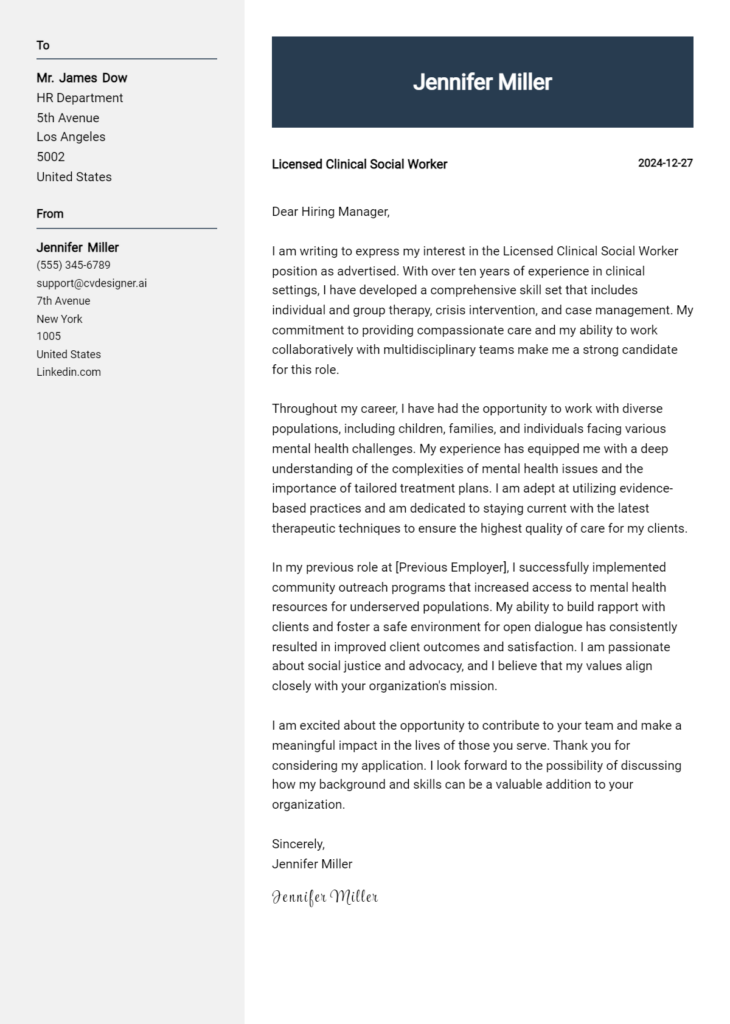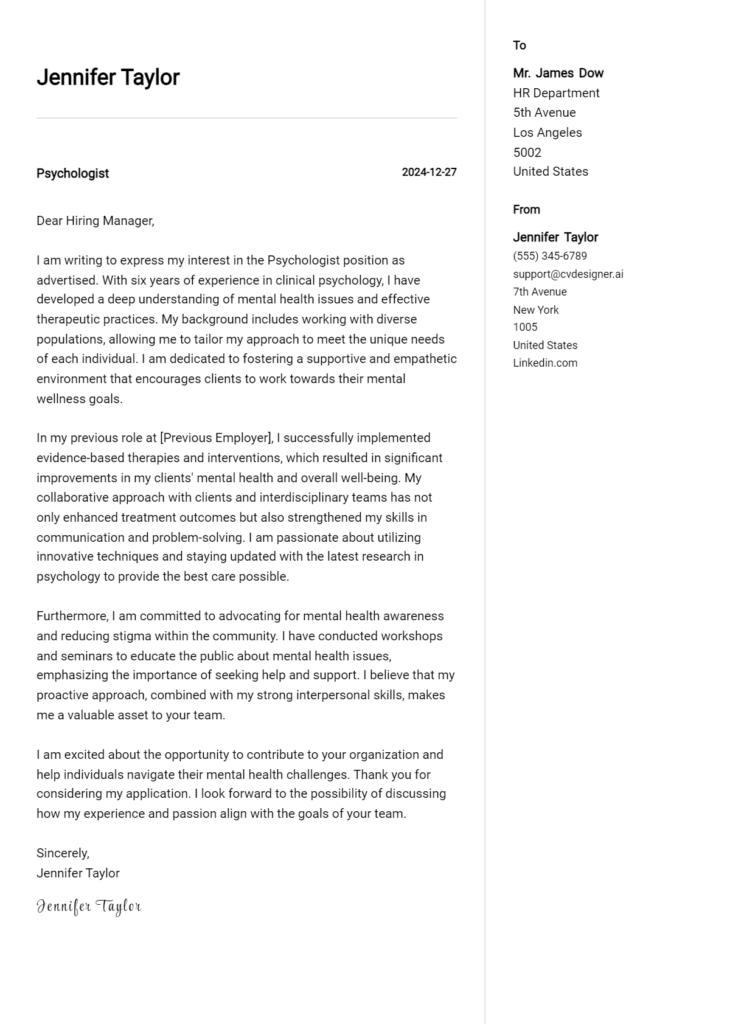Clinical Psychologist Cover Letter Examples
Explore additional Clinical Psychologist cover letter samples and guides and see what works for your level of experience or role.
How to Format a Clinical Psychologist Cover Letter?
Crafting a compelling cover letter is essential for Clinical Psychologists, as it serves as your first impression on potential employers. The format of your cover letter not only showcases your qualifications but also reflects your interpersonal skills and empathy—qualities vital in the field of psychology. A well-structured cover letter can effectively communicate your passion for mental health, your understanding of patient needs, and your professional approach to therapy.
In this guide, we will outline the key components of a professional cover letter specifically tailored for Clinical Psychologists, including:
- Cover Letter Header
- Cover Letter Greeting
- Cover Letter Introduction
- Cover Letter Body
- Cover Letter Closing
Each section is crucial in presenting your expertise and dedication to the profession. Let’s delve into each component and discover how to make your Clinical Psychologist cover letter memorable.
Importance of the Cover Letter Header for a Clinical Psychologist
The cover letter header is a crucial element that sets the tone for the entire application. It serves as the first point of contact between the applicant and the hiring manager, making clarity and professionalism essential. A well-structured header should include the applicant's contact information, the date, and the recipient’s details, ensuring that the reader can easily identify who the letter is from and how to get in touch. This not only reflects the clinical psychologist's attention to detail but also their understanding of formal communication, which is vital in the field of psychology.
Strong Example
Dr. Jane Smith, Psy.D. 123 Wellness Lane San Francisco, CA 94105 (123) 456-7890 janesmith@email.com October 10, 2023 Hiring Manager ABC Mental Health Clinic 456 Healing Road San Francisco, CA 94105
Weak Example
Jane S. Somewhere, USA No phone No email 10/10/23 To Whom It May Concern
The Importance of a Cover Letter Greeting for Clinical Psychologists
The greeting of a cover letter is more than just a formality; it sets the tone for the entire document and can significantly influence the hiring manager's first impression. A well-crafted greeting demonstrates professionalism and shows that the applicant has made an effort to personalize their application by addressing the hiring manager directly. This thoughtful approach not only reflects the candidate's attention to detail but also their genuine interest in the position. To avoid generic greetings that can make a cover letter feel impersonal, it's crucial to research the recipient's name, which can often be found on the company's website or LinkedIn profile. By doing so, candidates can create a connection right from the start.
Strong Greeting Example
Dear Dr. Smith,
Weak Greeting Example
To Whom It May Concern,
The Importance of a Well-Crafted Cover Letter Introduction for a Clinical Psychologist
A well-crafted cover letter introduction is crucial for a Clinical Psychologist as it serves as the first impression for the hiring manager. This opening statement should not only capture attention but also convey genuine enthusiasm for the position. It is an opportunity to succinctly express interest in the role and highlight key skills or notable achievements that make the candidate a strong fit. A compelling introduction can set the tone for the rest of the cover letter, making it essential to strike the right balance between professionalism and personality.
Strong Example
Dear [Hiring Manager's Name], I am thrilled to apply for the Clinical Psychologist position at [Company Name], as I am passionate about helping individuals navigate their mental health challenges. With over six years of experience in cognitive-behavioral therapy and a proven track record of reducing anxiety and depression symptoms in diverse populations, I am eager to bring my expertise to your esteemed team. My commitment to fostering a supportive therapeutic environment aligns perfectly with your organization’s mission to enhance mental well-being in our community.
Weak Example
To whom it may concern, I am writing to apply for the Clinical Psychologist job. I have some experience in the field and think I could do well in this position. I have worked with patients before, but I am not sure how my skills match what you are looking for.
Purpose of the Cover Letter Body for a Clinical Psychologist
The body of a cover letter for a Clinical Psychologist serves as a critical platform for candidates to articulate their unique qualifications, experiences, and the specific value they bring to an organization. This section allows candidates to highlight relevant skills, such as therapeutic techniques or assessment competencies, while also detailing impactful projects or accomplishments that demonstrate their effectiveness in clinical settings. By providing concrete examples of past work, candidates can illustrate their ability to contribute positively to the organization, making a compelling case for their candidacy.
Strong Example
I am particularly proud of my role in developing a community-based mental health program that successfully increased access to therapy for underserved populations. By collaborating with local organizations, I was able to implement evidence-based practices that resulted in a 30% improvement in client outcomes over one year. My experience in cognitive-behavioral therapy and trauma-informed care has equipped me to work effectively with diverse populations, and I am eager to bring this expertise to your team to further enhance patient care and support the organization’s mission.
Weak Example
I have worked in several places and helped many people. I am good at therapy and have some experience with different types of patients. I think I would fit in well at your clinic because I want to help people.
Importance of the Cover Letter Closing for a Clinical Psychologist
The closing paragraph of a cover letter is crucial for leaving a lasting impression on potential employers. It serves as a final opportunity to summarize your qualifications, express your enthusiasm for the role, and encourage the hiring manager to take the next steps, such as reviewing your resume or scheduling an interview. A strong closing reinforces your fit for the position and can motivate the reader to take action. Below are examples of both effective and ineffective closing paragraphs.
Strong Example
Thank you for considering my application for the Clinical Psychologist position at [Company Name]. With my extensive experience in cognitive behavioral therapy and a deep commitment to promoting mental health, I am excited about the opportunity to contribute to your team. I look forward to the possibility of discussing how my background and skills align with the needs of your clients. Please feel free to contact me to schedule an interview at your convenience. I have attached my resume for your review and am eager to provide any additional information needed.
Weak Example
Thanks for reading my letter. I hope you liked it. I think I would be a good psychologist. You can look at my resume if you want, and maybe we can talk sometime.
Crafting an effective cover letter for a Clinical Psychologist position is crucial in standing out among candidates. This document not only reflects your professional qualifications but also showcases your technical skills, problem-solving abilities, knowledge of the software development life cycle (SDLC), teamwork capabilities, and a passion for continuous learning. By emphasizing these areas, you can create a compelling narrative that resonates with potential employers. Here are five detailed tips to help you write an impactful cover letter.
Tips for Writing an Effective Cover Letter
Highlight Technical Skills
As a Clinical Psychologist, it’s essential to demonstrate your technical expertise, whether it’s understanding psychological assessments, data analysis, or familiarity with therapeutic software. Clearly articulate these skills in your cover letter, using specific examples from your previous experiences. This will show potential employers that you are well-equipped to handle the technical aspects of the role.Showcase Problem-Solving Abilities
Employers value candidates who can tackle challenges effectively. Use your cover letter to discuss a specific instance where you identified a problem in a clinical setting and implemented a successful solution. This not only illustrates your critical thinking skills but also your ability to adapt and respond to complex situations in psychology.Demonstrate Knowledge of SDLC
Understanding the Software Development Life Cycle can be advantageous, especially if you’re working with electronic health records (EHR) or psychological software. If applicable, mention your familiarity with SDLC phases and how this knowledge can contribute to enhancing clinical workflows or improving patient care systems.Emphasize Teamwork and Collaboration
Clinical psychology often involves working within a multidisciplinary team. Highlight your experience collaborating with other healthcare professionals, such as psychiatrists, social workers, or nurses. Describe how teamwork has positively impacted your work and patient outcomes, showcasing your ability to contribute to a cohesive clinical environment.Express a Passion for Continuous Learning
The field of psychology is ever-evolving, and demonstrating a commitment to continuous learning is vital. Mention any ongoing education, workshops, or certifications you are pursuing. This not only reflects your dedication to professional growth but also indicates that you are proactive in staying updated with the latest research and methodologies in psychology.
By incorporating these tips into your cover letter, you can effectively showcase your qualifications and passion for the role of Clinical Psychologist. For additional help in crafting your cover letter, consider utilizing cover letter templates or a cover letter builder to enhance your writing process.
Common Mistakes to Avoid in a Clinical Psychologist Cover Letter
Crafting a compelling cover letter is essential for standing out in the competitive field of clinical psychology. Avoiding common mistakes can significantly enhance your chances of making a favorable impression. Here are some frequent pitfalls to watch out for:
Generic Greeting: Using a vague salutation like "To Whom It May Concern" can seem impersonal. Instead, try to find the hiring manager's name for a more tailored approach.
Lack of Specificity: Failing to mention specific experiences or skills relevant to the position can make your cover letter forgettable. Tailor your content to the job description, showcasing your unique qualifications.
Overly Formal Language: While professionalism is key, overly stiff language can create distance. Strive for a balance between professionalism and warmth to connect with the reader.
Neglecting Formatting: A cluttered or unprofessional layout can distract from your message. Ensure you follow a clear cover letter format that enhances readability.
Repetition of the Resume: Your cover letter should complement your resume, not reiterate it. Use this opportunity to highlight your personality, values, and why you're passionate about clinical psychology.
Ignoring the Employer's Needs: Focusing solely on what you want can come off as self-centered. Instead, emphasize how your skills can address the employer's needs and contribute to their goals.
Typos and Grammatical Errors: These mistakes can undermine your professionalism and attention to detail. Proofread your letter multiple times and consider asking someone else to review it.
By being mindful of these common mistakes, you can create a strong cover letter that effectively showcases your qualifications and enthusiasm for the role. For inspiration, check out some cover letter examples that can help guide your writing process.
Cover Letter FAQs for Clinical Psychologist
What should I include in my cover letter as a Clinical Psychologist?
In your cover letter, you should include your relevant qualifications, clinical experience, and any specialized training that aligns with the job you're applying for. Start with a strong opening that captures your interest in the position and the organization. Detail specific experiences where you successfully implemented therapeutic techniques, assessed patient needs, or contributed to treatment plans. Highlight any relevant certifications, such as licensure or specialty training in areas like cognitive-behavioral therapy or trauma-informed care. Finally, articulate your passion for mental health and how it drives your approach to patient care, emphasizing your commitment to ongoing professional development.
How can I demonstrate my clinical skills in a cover letter?
To effectively demonstrate your clinical skills, use specific examples from your past experiences. Describe a challenging case you managed, outlining the assessment process, the therapeutic interventions you employed, and the outcomes. Highlight your ability to work collaboratively with interdisciplinary teams and your experience in conducting psychological assessments. Mention any research projects, publications, or presentations that showcase your expertise in psychological theory or practice. Additionally, emphasize your communication skills, detailing how you effectively engage with patients and families to foster trust and facilitate treatment. This will provide tangible evidence of your competencies.
Should my cover letter be tailored for each application?
Yes, tailoring your cover letter for each application is crucial. It allows you to connect your specific skills and experiences to the unique requirements of the job. Begin by researching the organization, its values, and its approach to mental health care. Then, align your professional background with their needs, whether that be working with specific populations or utilizing particular therapeutic modalities. Use keywords from the job description to demonstrate your fit. Personalization not only shows your enthusiasm for the position but also indicates that you've taken the time to understand how you can contribute to their mission.
How long should my cover letter be?
Your cover letter should ideally be one page long, typically consisting of three to four paragraphs. Start with a strong introduction that captures attention, followed by a concise overview of your qualifications and relevant experiences. Use the body to elaborate on specific skills and achievements that align with the job description. Conclude with a compelling closing statement expressing your enthusiasm for the role and a call to action, such as a request for an interview. Keeping your cover letter concise and focused demonstrates your professionalism and respect for the hiring manager's time, ensuring that your key points stand out.
Build your Cover Letter in minutes
Use an AI-powered cover letter builder and have your letter done in 5 minutes. Just select your template and our software will guide you through the process.

